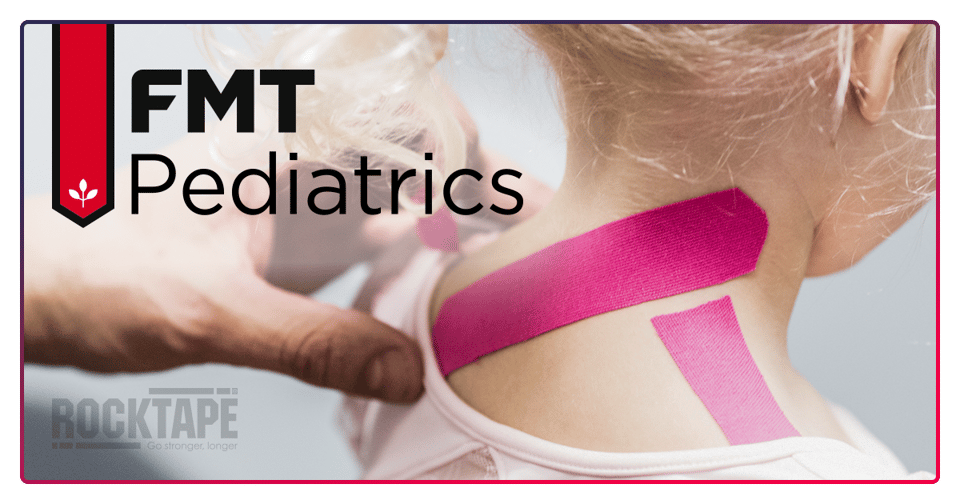FMT Pediatrics - Kinesiology Taping

Description
Until now, choices were limited if you wanted to learn how to use kinesiology tape with special patient populations like the elderly or children.
You don’t have to memorize percentages of stretch or direction of tape in order to get safe, effective results when taping special populations.
FMT Pediatrics introduces the concept of functional kinesiology taping methods with focus on special considerations for the pediatric population. Additionally, this course includes reviews of current literature supporting the theories of kinesiology taping for the purposes of discomfort* control, rehabilitation, edema/swelling management, and a variety of pediatric and adolescent injuries. Assessment and screening techniques will be delivered to enhance students’ knowledge of common pediatric conditions.
Additionally, FMT Pediatrics includes a review of taping techniques for neurologic, orthopedic and postural conditions. Tape strategies for acute and chronic sport-related injury in the pediatric population will be discussed, practiced and evaluated. Conditions like toe walking, poor postural control, torticollis and scoliosis will be introduced and tape strategies for pediatric patients and clients will be covered. Special tape techniques for smaller bodies will also be presented.
Functional Movement Training (FMT) courses are taught by industry leading experts in movement assessment, performance and rehabilitation. CEUs may be offered for DC, ATC, PT, LMTs, LAc, OTs and personal trainers. If your profession & state is unavailable, we do not currently offer CEUs – however, we are continually adding additional licenses.
Note: Tools are not provided with this course.
Learning Objectives
Define and consider pediatric population needs with respect to posture and injury
Define and discuss concepts of longitudinal myofascial chains as an approach to treatment for a multitude of pediatric conditions
Identify and explain the physiological effects of kinesiology taping
Critically analyze considerations of taping based on current bio psychosocial and movement therapy research
Apply and demonstrate functional taping applications for the pediatric population related to discomfort*, postural, and orthopedic conditions
Discuss and interpret kinesiology taping techniques for neurologic conditions in the pediatric population
Course Procedure
This course is 6 hours in length and a 30 Question multiple choice quiz will be required after completing the course to receive your CEU certificate. A 70% test score is required to pass and receive CEUs. The quiz can be open book and unlimited attempts on the quiz are allowed.
Course Content
| FMT Pediatric Taping | Module |
Jennifer Hutton, DPT

Jennifer Hutton became interested in physical therapy at young age, when her youngest cousin was diagnosed with cerebral palsy. As he began treatments, Jennifer spent time observing him in different therapies, and subsequently determined that she would work with children in a similar capacity. She graduated from Loma Linda University with her Doctorate in Physical Therapy in 2008, and moved back to her hometown Nashville, TN.
Jennifer currently works in one of the top children’s hospitals in Tennessee, treating the developmentally delayed population, as well as children with neurological and orthopedic diagnoses, both congenital and acquired. She is a Selective Functional Movement Assessment (SFMA), Functional Movement System (FMS), and a Myodetox Level 1 Certified (manual therapy) provider, and is the lead physical therapist in a regional combined specialty hip clinic, which offers preoperative and postoperative rehabilitation programs for local patients, as well as coordinated treatment plans with out of state physical therapists. Dr. Hutton works in conjunction with progressive orthopedic surgeons to develop cohesive, minimally invasive treatment programs. This includes a physical therapy approach to children with Perthes disease. She and her partners create content to educate the public on treatment alternatives, which include varied options for rehabilitation.
Dr. Hutton is involved in several community efforts for children with disabilities. She volunteers building adaptive bicycles for her local Amtryke chapter. She also serves on a committee that organizes an annual triathlon and is developing an adaptive sports camp, both for children with special needs. Jennifer truly enjoys working with children and believes that helping them achieve their independence, and empowering them to move better, will be pivotal as they progress in life.
Hour One
Welcome & Introduction of Instructor/ Trainer and participants
- Review of framework of the Movement Pyramid
Introduction of Taping History (Ch 1)
- Types of taping, rigid vs dynamic tape
- Kinesiology taping and its popularity
- Kinesiology tape – features and characteristics
- Tape application, skin preparation techniques
- Reducing risks involved in kinesiology taping
- Past and future taping techniques, trends and movements
Skin Anatomy/Physiology and Tape Mechanisms (Ch 2)
- Skin-brain connection
- Sensory system, discussion of hair follicles and skin receptors
- Cortical Homunculus Review
Effects and Benefits of Kinesiology Taping (Ch 3)
- Pain and how Kinesiology tape improved this
- Decompression and Mechanical effects of kinesiology tape
- Neurosensory communications to the brain via skin stimulation
Hour Two
Pain Mitigation (Ch 4)
- Pain Gate Theory
- Neuromatrix Model
- Biopsychosocial Model of Pain (BPS)
- Science Literature Review
Decompression Effect of Tape (Ch 5)
- Science Literature Review
Neurosensory Input Effect of Tape (Ch 6)
- Importance of brain’s role in movement
- Effects of Tape on Balance, Tactile Acuity
- Science Literature Review
- Does direction of tape and amount of tape stretch matter
Hour Three
Introduction of Fascia/fascial Lines (Ch 7)
- Importance of considering Fascial lines/developmental perspective
Research Review (Ch 8)
- Science Literature Review
- Does direction of tape and amount of tape stretch matter
Reduce risks involved in kinesiology taping (Ch 9)
- Tape application, skin preparation techniques
- Reducing risks involved in kinesiology taping
- Past and future taping techniques, trends and movements
Hour Four
Who is the pediatric population and how are they defined? (Ch 10)
- Neurologic Pediatric Population Characteristics
- Active Pediatric Population Characteristics
- Inactive Pediatric Population Characteristics
- Competitive/Athletic Pediatric Population Characteristics
- Atypically Developing Pediatric Population Characteristics
Kinesiology Taping for Specific Pediatric Conditions (Ch 11)
- Delayed Motor Milestones
- Neurologic
- Post-op & Trauma
- Posture
- Pain (Growth-Related and General)
- Sports-Related Pain
Hour Five
Tape for Motor Milestones: Rolling, Sitting, Quadruped/Crawling (Ch 12)
- Fascia’s Responsibility in support of motor milestones
- Rolling practical lab experience, instructor feedback
- Sitting practical lab experience, instructor feedback
- Crawling practical lab experience, instructor feedback
Neurologic Pediatric Conditions and Kinesiology Tape Applications and Tactics (Ch 13)
- Neurological Presentations
- Toe walking/Drop Foot practical lab experience, instructor feedback
- Low tone (Trunk) practical lab experience, instructor feedback
- Upper Extremity Erb’s Palsy practical lab experience, instructor feedback
- Hemiplegia practical lab experience, instructor feedback
- Cortical Thumb Taping practical lab experience, instructor feedback
Postural Concerns/Orthopedic Abnormalities (Ch 14)
Torticollis practical lab experience, instructor feedback
- Scoliosis practical lab experience, instructor feedback
- Pelvic Tilt Tapings practical lab experience, instructor feedback
- Lower Extremity Positional Abnormalities practical lab experience, instructor feedback
- Pronation/Supination of the Foot practical lab experience, instructor feedback
Hour Six
Pain Taping Discussion and Lab Experience (Ch 15-17)
- Sports/General Orthopedic
- Severs Disease – practical lab experience, instructor feedback
- Osgood Schlatter’s Disease – practical lab experience, instructor feedback
- Back Pain Taping
- Cervical – practical lab experience, instructor feedback
- Thoracic – practical lab experience, instructor feedback
- Lumbar – practical lab experience, instructor feedback
- Shoulder Pain practical lab experience, instructor feedback
- Little league Elbow/UCL Strain practical lab experience, instructor feedback
- Shin Splints Anterior and Medial Compartments practical lab experience
Fluid Dynamics/Swelling Taping Post-Op and Trauma (Ch 18)
- Post-Operative Bruising and Trauma conditions
- Jelly-Fish Taping for Edema and Lymphatic Support
PT/PTA
AL, CO, CT, IA, MA, ME, MN, NH, OR, SD, UT, WA, WY – FMT Pediatrics meets continuing education requirements for these State Physical Therapy Boards
AK, AZ, DE, GA, HI, ID, IN, MI, MS, MO, MT, NC, ND, PA, RI, SC, TN, VA – FMT Basic/Advanced meets continuing education requirements for these State Physical Therapy Boards by virtue of approval by APTA Kentucky, A Chapter of the American Physical Therapy Association, for 6 Category 1 contact hours.
KY - FMT Pediatrics has been approved by the APTA Kentucky, A Chapter of the American Physical Therapy Association, for 6 Category 1 contact hour(s). Approval number: 278-APTAKY-2024
TX – Approval (FMT Pediatrics 6 CCUs) approved by the Texas Board of Physical Therapy Examiners.
DC, IL – FMT Pediatrics (6 contact hours) meets continuing education requirements for these State Physical Therapy Boards by virtue of a National University of Health Sciences approval. NUHS is recognized by the Secretary of States Department of Education.
LMT
FMT Pediatrics (6 CEs) is approved (#179) by the National Certification Board for Therapeutic Massage & Bodywork (NCBTMB) as a continuing education Approved Provider.
OT
FMT Pediatrics meets continuing education requirements for AR, HI, ID, MA, ME, MI, NE, ND, SC, TX, VA, WI OT Boards.